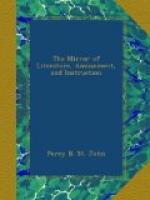Goldsmith has said, that “every man is the architect of his own fortune;” and perhaps there are few men, who, in the moments of their deepest suffering, have not felt the force of this assertion. In high life, embarrassments are generally to be attributed to the love of gambling, prodigality, or some such sweeping vice, which no station can control. Bankruptcies, or failures in trade, being common occurrences, are seldom traced to their origin, too often found to be in expensive habits, and overreaching or misguided speculations, and sometimes in the treachery and villany of partners; and, amidst this bad system, so nicely is credit balanced, that a run of ill luck, or a mere idle whisper, is often known to destroy commercial character of a century’s growth. But in these cases it should be recollected, that the reputation of the parties has probably been already endangered by some great stretch of enterprize, calculated to excite envy or suspicion.
Debts of fashion, or those contracted in high life, are usually the most unjust, probably the result of honesty being more a virtue of necessity than of choice, and of the disgraceful system of imposing on the extravagant and wealthy. Experience, it is granted, is a treasure which fools must purchase at a high price; but however largely we may hold possession of that commodity, it will not excuse that scheme of bare-weight honesty, which some are apt to make the standard of their dealings with the rich. A man of family, partly from indiscretion, and from various other causes, becomes embarrassed; the clamours of his creditors soon magnify his luxuries, but not a word is said about their innumerable extortions, in the shape of commissions, percentages, and other licensed modifications of cheatery, nor are they reckoned to the advantage of the debtor. These may be practices of experience, custom, and money-getting, but they are not rules of conscience. In truth, there is not a more painful scene than the ruin of a young man of family. There is so much vice and unprincipled waste opposed to indignant and rapacious clamour, often accompanied with idle jests. Here again is food for the vitiated appetites of scandalmongers, and that miserable but numerous portion of mankind, who rejoice at the fall of a superior. The name of debtor is an odium which a proud spirit can but ill support; cunning and avarice come in a thousand shapes, not to retrieve lost credit, but to swell the list of embarrassments;—friends have fled at the approach of the crisis, and associates appear but to pluck the poor victim of the wrecks of his fortune! Absenteeism, the curse of England, is the only alternative of wretched and humiliating imprisonment. An entire change of habit ensues: ease and elegance of manners dwindle into coldness and neglect, liberality to meanness, and good-natured simplicity to chicanery and cunning. In society, too, how changed; once the gay table companion, full of gallantry and wit, now solitary and dejected, with




